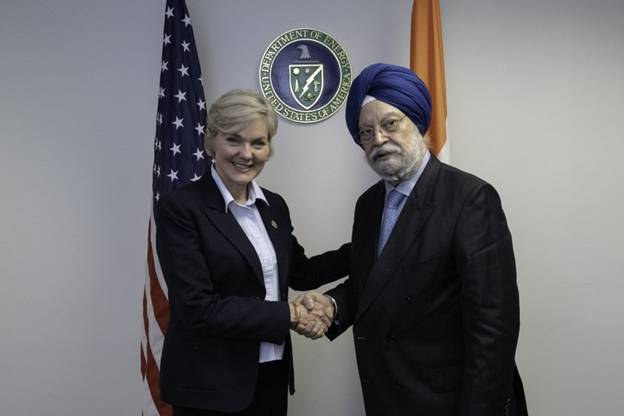Washington DC: The U.S.-India Strategic Clean Energy Partnership (SCEP) Ministerial was convened yesterday by U.S. Energy Secretary Jennifer Granholm and Indian Minister of Petroleum and Natural Gas Hardeep Singh Puri, marking significant progress in the two nations’ efforts to strengthen energy security and accelerate clean energy transitions. The ministers reviewed various initiatives under SCEP’s key pillars, including Power & Energy Efficiency, Renewable Energy, Emerging Fuels & Technologies, and Sustainable Growth.
Both sides welcomed the ongoing collaboration aimed at driving innovation in clean energy technologies, enhancing energy security, and building resilient, diversified supply chains for clean energy manufacturing. The discussions also focused on ensuring a just and sustainable energy transition that prioritizes affordable and reliable clean energy access.
Launch of Renewable Energy Technology Action Platform
One of the notable achievements highlighted was the formal launch of the Renewable Energy Technology Action Platform (RETAP) in August 2023. This initiative aims to develop roadmaps for hydrogen, long-duration energy storage, offshore wind, and geothermal energy through research, pilot projects, and public-private networks. Both nations expressed satisfaction with the progress made under RETAP, especially in the areas of clean hydrogen R&D and green hydrogen applications in transportation.
Additionally, collaboration on the National Centre for Hydrogen Safety in India and the successful organization of the 2nd International Conference on Green Hydrogen in September 2024 were celebrated. The ministers discussed expanded efforts on hydrogen cost reduction and the development of hydrogen hubs in both countries.
Energy Storage and Grid Modernization
Recognizing the importance of large-scale renewable energy integration, the ministers launched the public-private Energy Storage Task Force, which will address policy frameworks, safety, and manufacturing for energy storage solutions. The focus on long-duration energy storage and alternatives to lithium-ion technology was underscored, along with ongoing projects such as battery energy storage systems (BESS) in Assam and pilots in Haryana. Pumped storage solutions were also acknowledged as a long-term strategy.
Further advancements in grid modernization were discussed, with emphasis on smart metering deployment and power market reforms. The ministers commended efforts to support India’s renewable energy procurement and energy efficiency policy for Indian Railways, as it works toward achieving net-zero emissions by 2030.
Sustainable Aviation Fuel and Transportation Electrification
The partnership also announced new collaborations on sustainable aviation fuels (SAF), with an inaugural workshop focusing on R&D, financing, and fuel certification. The development of two joint reports on SAF and biofuels under the Biofuels Task Force was noted. Both nations reiterated their commitment to the electrification of medium- and heavy-duty vehicles, applauding the deployment of 10,000 e-buses under India’s PM eBus Sewa scheme.
Advancing Carbon Capture and Methane Abatement
Progress was made in the carbon capture, utilization, and storage (CCUS) workstream, with a workshop in August 2024 in Delhi outlining areas for increased cooperation on geologic carbon storage. Additionally, efforts to mitigate methane emissions in the oil and gas sector were recognized through collaboration with India’s Directorate General of Hydrocarbons (DGH).
Public-Private Partnerships and Clean Energy Investments
The ministers emphasized the importance of public-private sector dialogues in scaling clean energy technologies and fostering investment. A significant investment by Indian company Waaree in a 3GW solar module manufacturing facility in Texas was highlighted as a testament to growing commercial partnerships. Three new memoranda of understanding were also signed to advance emissions measurement and methane abatement in City Gas Distribution (CGD).





